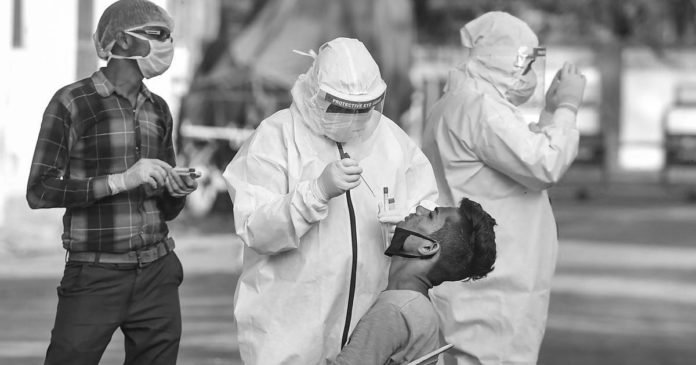India reported 9,195 new Covid cases,44% higher than yesterday, while the active cases have risen to 77,002, according to the Union health ministry data updated on Wednesday.
There are a total of 781 Omicron cases now in India, the most in Delhi, at 238 cases.
The death toll climbed to 4,80,592 with 302 fresh fatalities, according to the data updated at 8 am.
The active cases comprise 0.22 per cent of the total infections, the lowest since March 2020, while the national Covid-19 recovery rate has improved to 98.40 per cent, the highest since March 2020, the health ministry said.
An increase of 1,546 cases has been recorded in the active Covid-19 caseload in a span of 24 hours.
India’s COVID-19 tally had crossed the 20-lakh mark on August 7, 2020, 30 lakh on August 23, 40 lakh on September 5 and 50 lakh on September 16.
It went past 60 lakh on September 28, 70 lakh on October 11, crossed 80 lakh on October 29, 90 lakh on November 20 and surpassed the one-crore mark on December 19. India crossed the grim milestone of two crore on May 4 and three crore on June 23.
Union Health Minister Mansukh Mandaviya on Tuesday said that the Central Drug Authority CDSCO has approved the Serum Institute of India’s COVID-19 vaccine Covovax, Biological E’s jab Corbevax and anti-Covid pill Molnupiravir for restricted use in emergency situation. The announcement comes a day after the Subject Expert Committee (SEC) on COVID-19 of the Central Drugs Standard Control Organisation (CDSCO) recommended granting emergency use authorisation (EUA) to the COVID-19 vaccines Covovax and Corbevax with certain conditions.
It also had recommended granting restricted emergency use approval to the drug Molnupiravir for treatment of adult patients with COVID-19 and who have high risk of progression of the disease. In a tweet, the minister said, “Congratulations India. Further strengthening the fight against COVID-19, CDSCO, @MoHFW_INDIA has given 3 approvals in a single day for: – CORBEVAX vaccine – COVOVAX vaccine – Anti-viral drug Molnupiravir For restricted use in emergency situation”.
With this approval, the number of Covid vaccines which have received emergency use authorisation in the country has increased to eight. Six COVID-19 vaccines — Serum Institute’s Covishield, Bharat Biotech’s Covaxin, Zydus Cadila’s ZyCoV-D, Russia’s Sputnik V and the US-made Moderna and Johnson and Johnson — had already received EUA from the Indian drug regulator earlier.
India-US collaboration in the health sector is in the spotlight as the Central Drug Authority this week approved two more Covid vaccines Corbevax and Covovax and antiviral drug Molnupiravir for use in India. Taranjit Singh Sandhu, India’s Ambassador to the US, in a tweet described it as a model of India-US healthcare collaboration. “Models of what India-United States healthcare collaboration can achieve for global good!” Sandhu said.
Indian companies working with Texas Children’s, Baylor College of Medicine’s National School of Tropical Medicine; Dr. Peter Hotez, Prof and Dean of the National School of Tropical Medicine at Baylor and Co-Director of the Texas Children’s Hospital Center for Vaccine Development; NovaVax; Merck and Ridgeback Bio, tweeted the Indian diplomat.
During his visit to Houston in October, Sandhu had met Professor Hotez and held discussions on this issue. During his visit to Houston in October, Sandhu had met Professor Hotez and held discussions on this issue. In June this year, the ambassador visited the Novavax facility in Maryland. He also spoke to the CEO of Sanisure Thomas Hook. Sanisure supplies components for the SII – Novavax collaboration.
More about Omicron
The Omicron variant has been called a variant of concern by WHO based on studies that shows it has several mutations.
Still a lot of research is underway to evaluate its transmissibility, severity and reinfection risk.
The Omicron variant has been detected in several regions of the world. WHO reports that the likelihood of the Omicron variant spreading further globally is high.
It is not currently known if the Omicron variant is more or less severe than other strains of COVID-19, including Delta. Studies are ongoing and this information will be updated as it becomes available.
It is not yet clear whether Omicron can spread more easily from person to person compared to other variants, such as Delta.
However, being vaccinated and taking precautions such as avoiding crowded spaces, keeping your distance from others and wearing a mask are critical in helping to prevent the spread of COVID-19, and we know these actions have been effective against other variants.
Researchers are looking into any potential impact the Omicron variant has on the effectiveness of COVID-19 vaccines. Although information is still limited, WHO believes it is a reasonable assumption that the currently available vaccines offer some protection against severe disease and death.
It is also important to be vaccinated to protect against the other widely circulating variants, such as the Delta one. When it’s your turn, make sure to get vaccinated. If your vaccination involves two doses, it’s important to receive both in order to have the maximum protection.
According to WHO, early evidence suggests that people who have previously had COVID-19 could be reinfected more easily with Omicron, in comparison to other variants of concern. Information is still limited though and we will share updates as it becomes available.
Source: UNICEFRead more Health News
Latest update Omicron

